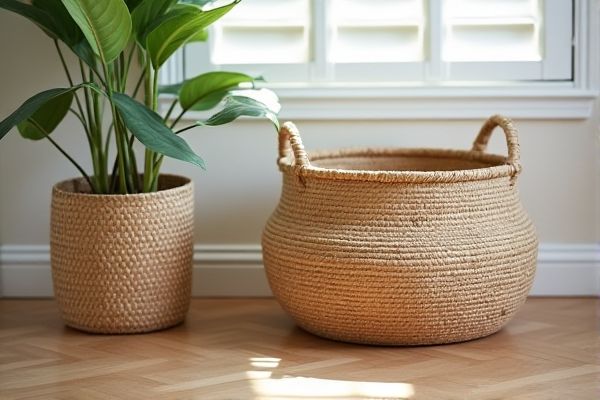
Woven baskets offer natural breathability, eco-friendliness, and a rustic aesthetic, making them ideal for home decor and sustainable storage solutions, whereas plastic baskets provide durability, water resistance, and ease of cleaning, suited for heavy-duty or outdoor use. Discover which option best fits Your needs by exploring the benefits and drawbacks of woven and plastic baskets in the rest of this article.
Table of Comparison
| Feature | Woven Basket | Plastic Basket |
|---|---|---|
| Material | Natural fibers (rattan, bamboo, seagrass) | Synthetic plastic (polypropylene, polyethylene) |
| Durability | Moderate; prone to wear & tear over time | High; resistant to impact and weather |
| Environmental Impact | Biodegradable and eco-friendly | Non-biodegradable; contributes to plastic pollution |
| Weight | Lightweight | Varies; generally lightweight to medium |
| Maintenance | Requires gentle cleaning; avoid moisture | Easy to clean; water-resistant |
| Design Variety | Handcrafted, unique patterns | Mass-produced, wide range of colors and shapes |
| Cost | Generally higher due to craftsmanship | Affordable and mass-produced |
| Use Cases | Decorative, storage, gifting | Storage, organizing, outdoor use |
Introduction: Woven Basket vs Plastic Basket
Woven baskets, crafted from natural materials like rattan or bamboo, offer durability, eco-friendliness, and aesthetic appeal compared to plastic baskets. Plastic baskets provide lightweight convenience, water resistance, and often lower costs but may contribute to environmental pollution. Choosing between the two depends on your preference for sustainability and design versus practicality and price.
Material Composition and Sustainability
Woven baskets are typically made from natural materials such as rattan, bamboo, or seagrass, offering biodegradability and low environmental impact due to their renewable sources. Plastic baskets are composed of synthetic polymers like polyethylene or polypropylene, which are durable but contribute to plastic pollution and require significant energy for production and disposal. Your choice of woven baskets supports sustainability by reducing reliance on non-biodegradable plastics and promoting eco-friendly material cycles.
Durability and Longevity
Woven baskets made from natural materials like rattan or bamboo offer impressive durability due to their flexibility and resistance to cracking, making them ideal for long-term use in varied environments. Plastic baskets are generally more resistant to moisture, mold, and pests, ensuring longevity in damp or outdoor settings but may become brittle and crack over time when exposed to UV rays or extreme temperatures. Choosing between woven and plastic baskets depends on specific use cases, with woven baskets excelling in durability for indoor storage and aesthetic appeal, while plastic baskets provide superior longevity in harsh or wet conditions.
Environmental Impact
Woven baskets, typically made from natural materials like rattan, bamboo, or seagrass, offer a biodegradable and renewable alternative with minimal environmental footprint compared to plastic baskets. Plastic baskets, derived from petroleum, contribute significantly to pollution and landfill waste due to their non-biodegradable nature and lengthy decomposition process. Choosing woven baskets supports sustainable practices, reducing harmful environmental impact and promoting eco-friendly living for your home or business.
Aesthetic Appeal and Design Variety
Woven baskets showcase natural textures and intricate patterns that enhance aesthetic appeal, offering a timeless, artisanal look that complements diverse interior styles. Plastic baskets provide a wide range of colors, shapes, and sizes, allowing for versatile and customizable storage solutions suited to modern, vibrant environments. Consumers often choose woven baskets for their organic beauty, while plastic baskets attract those seeking practical design variety and durability.
Practical Uses and Applications
Woven baskets are ideal for storing and organizing household items, laundry, and decorative purposes due to their breathability and natural aesthetic. Plastic baskets offer durability and water resistance, making them suitable for outdoor use, heavy-duty storage, and wet environments like bathrooms or kitchens. Both materials serve diverse practical applications, but choice depends on factors such as intended use, durability requirements, and environmental considerations.
Maintenance and Cleaning Requirements
Woven baskets, made from natural fibers like rattan or bamboo, require gentle cleaning with a soft brush or damp cloth to avoid damage and prevent mold growth. Plastic baskets are easier to maintain, as they can be washed thoroughly with soap and water and dried quickly without risk of deterioration. Regular maintenance of woven baskets involves avoiding prolonged exposure to moisture, while plastic baskets offer superior resistance to stains and water.
Cost Comparison
Woven baskets typically have a higher upfront cost due to natural materials and craftsmanship, whereas plastic baskets are more affordable and mass-produced. Over time, woven baskets may offer better durability and eco-friendliness, potentially reducing replacement expenses. Your choice depends on balancing initial budget constraints with long-term value and environmental impact.
Safety and Health Considerations
Woven baskets made from natural fibers are generally safer and healthier as they are free from harmful chemicals and toxins commonly found in some plastic baskets, such as BPA and phthalates. They offer better breathability, reducing the risk of mold and bacteria buildup compared to non-porous plastic materials. Choosing a woven basket supports your well-being by minimizing exposure to potentially hazardous substances while maintaining a more hygienic storage environment.
Which Basket is Right for You?
Woven baskets, crafted from natural materials like rattan or bamboo, offer eco-friendly durability and aesthetic appeal, making them ideal for home decor and light storage. Plastic baskets provide lightweight, waterproof, and easy-to-clean options suitable for outdoor use and heavy-duty storage needs. Your choice depends on preferences for sustainability, style, and functional requirements in daily use.
 homyna.com
homyna.com